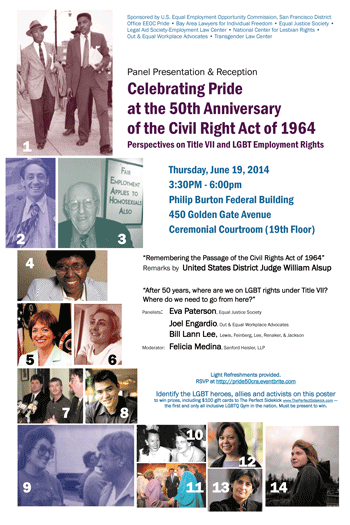“Gay people are the new barometer for social change.”
~ Bayard Rustin
On June 20, 2014, the Equal Employment Opportunity Commission (EEOC) hosted Pride at 50: The Civil Rights Act of 1964. Almost 100 people from all walks of life attended the program. It was truly an inspiring event to participate in.

Malihe Kigasari, a leader of EEOC Pride, opened the event. Mahile’s discussion of her personal reverence for the American civil rights movement as a lesbian who immigrated to the states from Iran was a poignant reminder for me of how many people outside of the U.S. view this country as a beacon of hope. It was a resonant reminder that for them and for ourselves we must continue the fight for equality and the highest standards of decency. Next up was keynote speaker, Judge William Alsup – a federal judge in the Northern District of California. A former clerk for civil rights champion and Supreme Court Justice William O. Douglas, Judge Alsup grew up in the Jim Crow Mississippi. He spoke about what it was like to be a young adult in the South during the passing of the Civil Rights Act of 1964, bringing to life the grotesque reality of racism in America that many have tried so hard to erase from the history books or have forgotten. Coupled with endearing photos of his personal journal and newspaper clippings from the time period, Judge Alsup walked the audience through both the cultural and political forces that brought the Civil Rights Act (CRA) into being, including behind the scenes deals between President Johnson and Everett Dirksen. The most powerful part of Judge Alsup’s presentation was his description of the contrast between the times immediately preceding and following the passage of the CRA, and how so suddenly, like flicking a switch, a single act of policy could deeply affect the lives of so many people across the country.
I was excited to be given the opportunity to moderate a panel about LGBT Rights under Title VII with some incredible advocates who have dedicated their careers to fighting for social justice: Eva Paterson, Joel Engardio, and Bill Lann Lee. Again, these are advocates who are doing tremendous work for all of us, and if you don’t know about them, you should. Bill Lee is the former Assistant Attorney General for Civil Rights in the US Department of Justice under President Clinton, who also served as an attorney at the NAACP Legal Defense and Educational Fund for 18 years. Joel Engardio, an award-winning columnist and civil liberties advocate, is currently the Associate Director of Communication for Out & Equal Workplace Advocates, which is dedicated to ending LGBT discrimination in the states where employees can still be fired based on sexual orientation or identity. Eva Paterson is a leading civil rights attorney and co-founder and President of the Equal Justice Society.
While I couldn’t possibly capture all of the information provided by the speakers, some of the takeaways that stuck with me from the day were:
- We in the LGBT community (approximately 5.4 million of us work in the U.S.) have to rely on trying to protect our rights under Title VII’s prohibitions on “gender” discrimination because we don’t get protections of the federal law (and some areas state law) independently. It is so important that Congress pass ENDA so that it is no longer legal to be denied employment, harassed, or fired just because of who we, in the LGBT community, love or how we identify.
- Approximately 1.8 million LGBT workers in the U.S. are –like me—also people of color. Of those 1.8 million, 267,000 are undocumented. The immense impact of employment law on these groups can hardly be understated.
- We can’t forget that even within discriminated groups, discrimination takes different forms and is felt more acutely at different stages of employment or attempts to enter the workforce. For example, unemployment rates for transgender people of color are at least 4 times higher than the national unemployment rate. Anything that leaves out protections for transgender people isn’t a solution that works.
To close, I’ll leave you with this excerpt of my opening remarks:
As a woman — a woman of color — a woman of color who loves women, I am able to be here today and moderate this important panel discussion only because of the tireless work of those who came before me. Advocates and heroes like the individuals I am so honored to sit beside today. So we must begin with thanks. Thanks to them and thanks to all of those who have fought so hard beside and before them.
Only fifty years earlier, the smallest of increments in the passage of history, it was lawful to discriminate against people of color and women in the workplace. Title VII was truly landmark legislation. In the intervening years, it has contributed immensely to the promotion of equality and diversity in the workforce. But for Title VII, it is hard to imagine that I would be here.
And yet. Five decades later, it remains legal in the vast majority of this country to discriminate against members of the LGBT community in the workplace. Put another way, even now – in the 21st century, even here – in the United States, it would be legal for most employers to treat me differently, refuse to hire me or to be able to fire me, simply because of who I love.
There is so much to be done to shatter the ceilings and break down the walls of discrimination. I take comfort in knowing how many of you are out there bending the arc of the moral universe towards justice.








